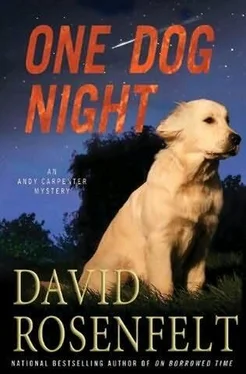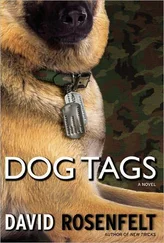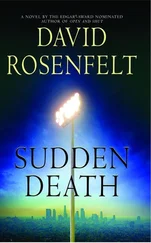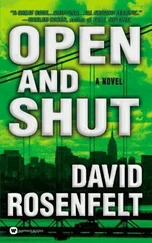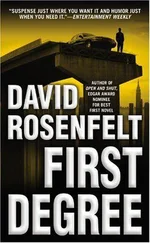“Anything interesting?”
“He made four trips in the six weeks before the fire. The first one was to Texas, then Georgia, Arkansas, and Texas again.”
“If there’s something revealing in there, I’m missing it.”
“You’ll find it eventually.”
“Eventually isn’t going to be nearly good enough.”
When I get back to the office, Agent Mulcahy is waiting for me.
Which is good, because I was going to call him. We have a lot to talk about.
The fact that he has come to my office gives me a small advantage; usually in a case like this he would try to summon me to the bureau offices, and then intimidate me when I got there. Of course, that small advantage does not quite make up for the fact that he has the entire government of the United States behind him, while I have Hike and Edna.
But for now it’s just him and me talking alone in my office, which is interesting in itself. Usually agents like Mulcahy travel in twos, and play “good cop/bad cop.” In this case Mulcahy is playing “only cop,” and that could mean he wants to trade.
“Nice place you got here,” he says, looking around as if he stepped in shit.
“Thanks; I’ll convey your appreciation to my decorator.”
“You do that,” he says. “So I read the transcript of your interview with our agents in Delaware. From what I gather, you and the judge were just chatting away, about nothing in particular, and he shot himself?”
“That pretty much sums it up,” I say.
“Having heard you talk in court, it does make some sense,” he says. “I took the bullets out of my own gun before coming here, just in case.”
I nod. “Wise move.”
“Other than you annoying him to death, why did he do it?”
“Mmmm, that’s a tough one.”
“Be careful, Carpenter.”
“No, I don’t think so. I’ve got a guy who’s never hurt a soul probably going off to prison for the rest of his life. If I’m going to prevent that, the last thing I need to be is careful.”
“Is that right?” He doesn’t seem cowed, but I’m not in the mood to care.
“That’s exactly right. And you know what else? I think you know he never set that fire, and you’re sitting back and watching it happen.”
“You should have presented a more effective case,” he says.
“Okay, here’s the way we’re going to do it. You’re going to tell me information you have that can help me, and then I’m going to tell you information that I have that will help you. And you’re going to go first.”
“Why would I go first?”
“Because I don’t trust you, and because you’re worried, and because my information is probably better than yours.”
He smiles, as if he thinks that’s amusing as hell, even though he doesn’t. “What would possibly make you think I’m worried?”
“Because you’re sitting here. Your agents already asked me every question there was to ask. If you’re sitting here, it’s because you have a different agenda.”
“Okay,” he says. “Deal.”
“I’m not finished with the terms yet. You’re going to go to the judge with me, on the record or off, and tell him to reopen the trial.”
“You think I can tell De Luca what to do?”
“I think you can try. Now tell me something I don’t know.”
He pauses, as if trying to decide what to say. There’s no doubt that he knew even before he got here what he could and could not say; he’s probably under very specific orders about it. But his open pondering is to give the illusion that he is in charge.
“There has been a lot of chatter these last few months.”
I interrupt. “Chatter?”
“That’s spy talk meaning we hear stuff. A foreign entity has been very interested in the result of the Delaware trial.”
“Which foreign entity?”
“You don’t need to know that,” he says. “Let’s just say that it isn’t Switzerland or Luxembourg. It’s a country that we very much do not want to have WMDs.”
“And is that what this is about? This chatter?”
“It’s very possible,” he says. “Which makes this a little bigger than Noah Galloway.”
I shake my head. “That’s not how the system works. I’m his lawyer; for me there’s nothing bigger than Noah Galloway. How long have you known that this foreign stuff is tied to this case?”
“Not very long; in fact, we’re still not positive that it does. But you’re making a good case; we’re more willing to see all possibilities than a jury is.”
“Tell it to the judge.”
He nods. “Now tell me what I don’t know.”
“There’s a cottage blackmail industry that’s been thriving; Loney was one of the people behind it. They find things out about people, or they do them very illegal favors. Either way they’ve got them from that point on, and they extract favors from them. Judge Holland was one of those people; Alex Bauer was another.”
“And they told Holland how to rule in that case?”
“I’m sure they did. Alex Bauer told me so.” I feel as if I can break the confidentiality of what Bauer told me; being dead means he doesn’t require protection.
“Give me a name besides Loney,” Mulcahy says.
“Brett Fowler. He’s a political consultant in D.C. He either killed Bauer or had it done.”
Mulcahy doesn’t take any notes; he either knows Fowler or has confidence in his own memory. “What else?”
I don’t want to tell him about Judge Holland’s son. I don’t see how I could be risking national security in the process. It doesn’t matter what they were blackmailing Holland with; the important point is that they were doing it.
“Steven Lockman was an assayer employed by Milgram. He disappeared around the time of the fire, and was never heard from again.”
“You think he was in the fire?”
“I do. I’m speculating here, but I think he found something important, maybe on Milgram land, and the wrong people found out about it before his management did. They killed him, and used Bauer to get the company. But it took a long time.”
“The people we’re dealing with are patient,” he says. “We think in weeks; they think in decades.”
“Lockman’s last trip before he died was to Texas; he flew into Dallas. He went there twice, and Milgram has land in east Texas waiting to be drilled on.”
“It can’t be about oil,” he says.
“What about something dangerous, like uranium?”
He shakes his head. “No. Uranium can be had; it’s enriching it that’s the tough part.”
He doesn’t wait for me to respond. “Thanks for this,” he says. “Set up the meeting with De Luca.”
I get a little anxious while waiting for a verdict.
At least that’s how I would describe it. Laurie sees it a little differently; she says I get “totally psychotic” and “unbearable to be with.”
I am not generally a superstitious person, but during a verdict-wait superstitions run my life. Everything I’ve ever done during this period on a case I’ve ultimately won becomes something I have to do each subsequent time. It’s exhausting.
I’m always pessimistic while waiting for a jury; but this time I’m even more sure we’re going to lose; I believe that if I were on the panel I’d vote to convict.
It’s the ultimate defense attorney’s nightmare. A client whom he likes and knows to be innocent gets convicted and spends year after year in jail. There is no question that a life sentence for Noah would mean one of my own as well.
Usually I have nothing to do other than wait, but this time is different. If we’re going to lose this trial, then we need to develop evidence that can exonerate Noah, or at least earn him a new trial. Focusing on the investigation at least takes my mind off the verdict. A little bit, anyway.
Читать дальше
